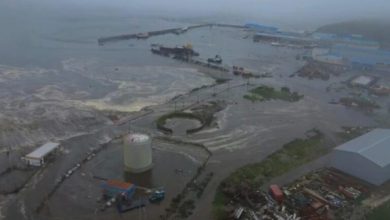UN Warns of Worsening Hunger in Global Hotspots, Urges Urgent Action to Avert Famines
UN warns famine looms in Gaza, Sudan, and others without swift global humanitarian action.
FAO and WFP urge urgent aid as hunger surges from war, economic shocks, and climate disasters.
The United Nations has raised a serious alarm over escalating hunger crises across 13 critical global regions, warning that five of these areas including Gaza, Sudan, South Sudan, Haiti, and Mali are now at immediate risk of famine unless rapid and sustained humanitarian action is taken.
In its latest “Hunger Hotspots” report released on Monday, the UN Food and Agriculture Organization (FAO) and the World Food Program (WFP) said the worsening conditions are being driven by a combination of violent conflict, economic instability, and climate-related disasters. These factors, the agencies stressed, are not only disrupting food production and access but are also significantly hampering the ability of humanitarian organizations to deliver aid effectively.
The report, which forecasts potential food crises over the next five months, identifies countries and regions where hunger levels are expected to rise sharply. It issues an urgent appeal for international support to prevent widespread starvation and potential famine in the most severely affected zones.
“This report is a red alert,” said Cindy McCain, Executive Director of the World Food Program. “We know exactly where hunger is deepening, and we know who is most at risk. But without the necessary funding and secure access, we are helpless to prevent this catastrophe.”
Among the most concerning situations highlighted in the report is the ongoing crisis in Gaza, where months of armed conflict have decimated infrastructure, disrupted supply chains, and left a large portion of the population facing critical food shortages. Similarly, in Sudan and South Sudan, political unrest and internal displacement have compounded already fragile food systems, pushing millions closer to the brink of starvation.
The humanitarian crisis in Haiti continues to deepen due to gang violence, economic instability, and natural disasters, which have restricted access to food, clean water, and healthcare. Meanwhile, Mali’s long-standing security crisis and climate-induced drought have worsened food insecurity in already vulnerable communities.
The UN defines famine as a situation in which at least 20 percent of a population faces extreme food shortages, 30 percent of children are suffering from acute malnutrition, and the daily death rate exceeds two people per 10,000 due to hunger or hunger-related illnesses.
According to the FAO-WFP report, these conditions could soon materialize in the five identified hotspots if urgent humanitarian assistance does not reach those in need. However, access to affected populations remains a major hurdle, with aid efforts being severely hampered by insecurity and chronic underfunding.
The report calls for immediate investment in food aid, agricultural support, and infrastructure that would allow aid agencies to reach the most vulnerable. It also advocates for greater diplomatic efforts to reduce conflict and promote stability in the affected regions.
In closing, the UN agencies emphasized that early action could still save lives and prevent famine-level disasters. They urged governments, international donors, and global stakeholders not to wait until the worst-case scenarios unfold before acting.
“We must not allow famine to become a forgotten crisis,” McCain warned. “The time to act is now.”



